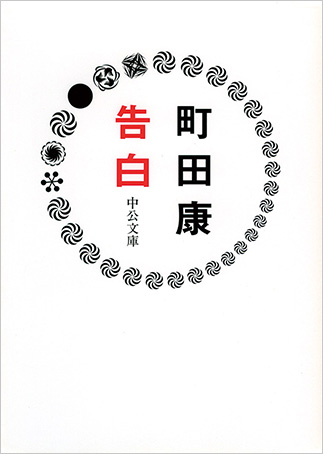
KINKI
Kokuhaku
[Confession]
Chūōkōron Shinsha (Chūkō Bunko), 2008. 850 pp. ¥1,143. ISBN 978-4-12-204969-7.
Also published in: Korean
Machida Kō is an author with a unique résumé, having taken up writing after a period as a punk-rock singer. With his ability to open up new areas of potential for contemporary Japanese fiction, today he is seen as one of the country’s most vital writers. Kokuhaku is a noteworthy work putting his full talent as a novelist on display.
The protagonist of the novel is a real figure from history, Kumatarō, a notorious killer who carried out the “10 Kawachi murders” in 1893 in what is today part of Osaka Prefecture. The book traces his interior landscape and actions from his early years to the tragic conclusion of his life. It draws on historical fact to describe the time in which the story is set, but this is no ordinary work of historical fiction. The entire novel is infused with the theme of the gaps between what people think and what they express in words. Kumatarō is a deeply contemplative character, despite being born into the poverty of a farming household, and throughout his life he is tormented by the inability to find the words he needs to express the ideas in his mind.
The novelist makes talented use of Kawachi-accented Japanese as he depicts the words and psychology of the protagonist throughout this lengthy work. Machida makes use of unusual rhythms in his writing, which features a delicate balance between the Kawachi dialect and standard Japanese, dialogue that can be as amusing as a comedy sketch, and piercingly accurate observations of human beings. All these factors make his text one that keeps a firm grip on the reader’s attention until the book’s very end. (NM)
The protagonist of the novel is a real figure from history, Kumatarō, a notorious killer who carried out the “10 Kawachi murders” in 1893 in what is today part of Osaka Prefecture. The book traces his interior landscape and actions from his early years to the tragic conclusion of his life. It draws on historical fact to describe the time in which the story is set, but this is no ordinary work of historical fiction. The entire novel is infused with the theme of the gaps between what people think and what they express in words. Kumatarō is a deeply contemplative character, despite being born into the poverty of a farming household, and throughout his life he is tormented by the inability to find the words he needs to express the ideas in his mind.
The novelist makes talented use of Kawachi-accented Japanese as he depicts the words and psychology of the protagonist throughout this lengthy work. Machida makes use of unusual rhythms in his writing, which features a delicate balance between the Kawachi dialect and standard Japanese, dialogue that can be as amusing as a comedy sketch, and piercingly accurate observations of human beings. All these factors make his text one that keeps a firm grip on the reader’s attention until the book’s very end. (NM)

Translation rights inquiries
Chūōkōron Shinsha Inc.
(attn. Responsible for Rights Management)
Yomiuri Shimbun Bldg. 19F, 1-7-1
Ōtemachi, Chiyoda-ku, Tokyo 100-8152
Email: chosaku@chuko.co.jp
(When sending an e-mail, please enter a half-width character "@" instead of a full-width character "@.")


